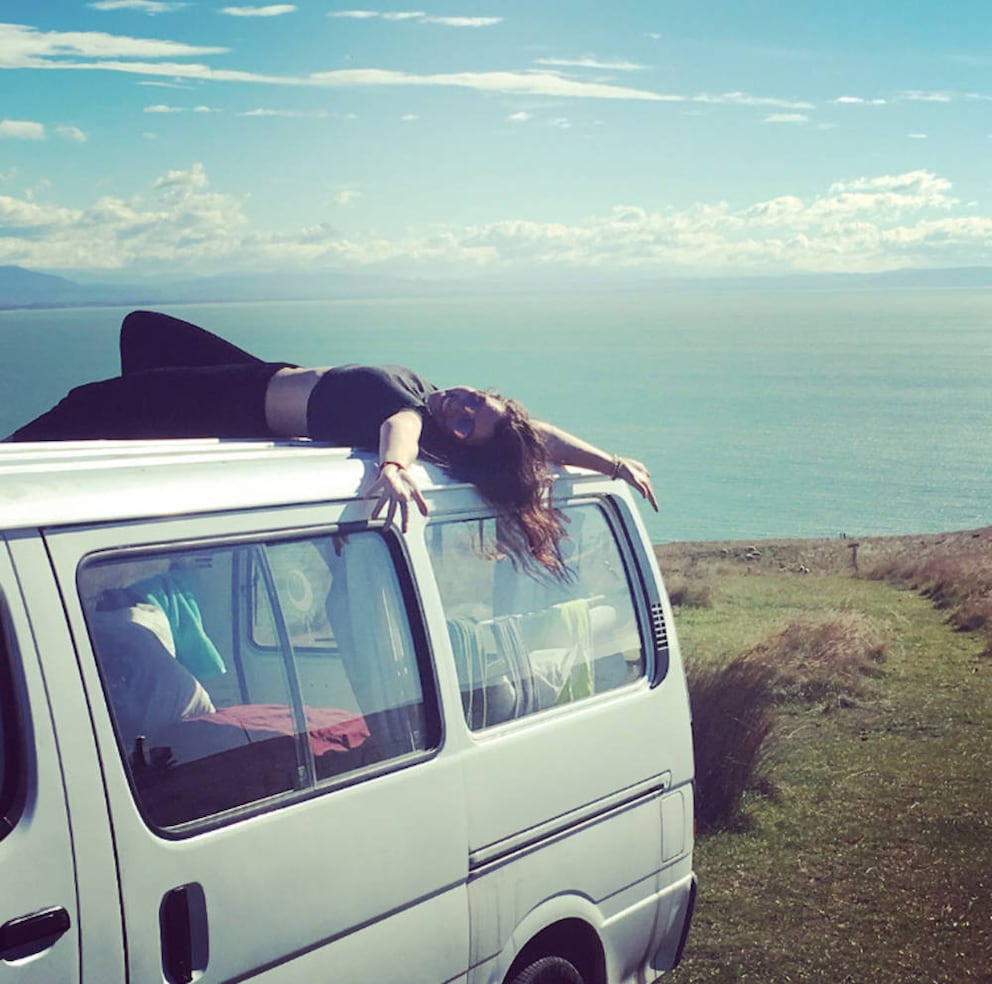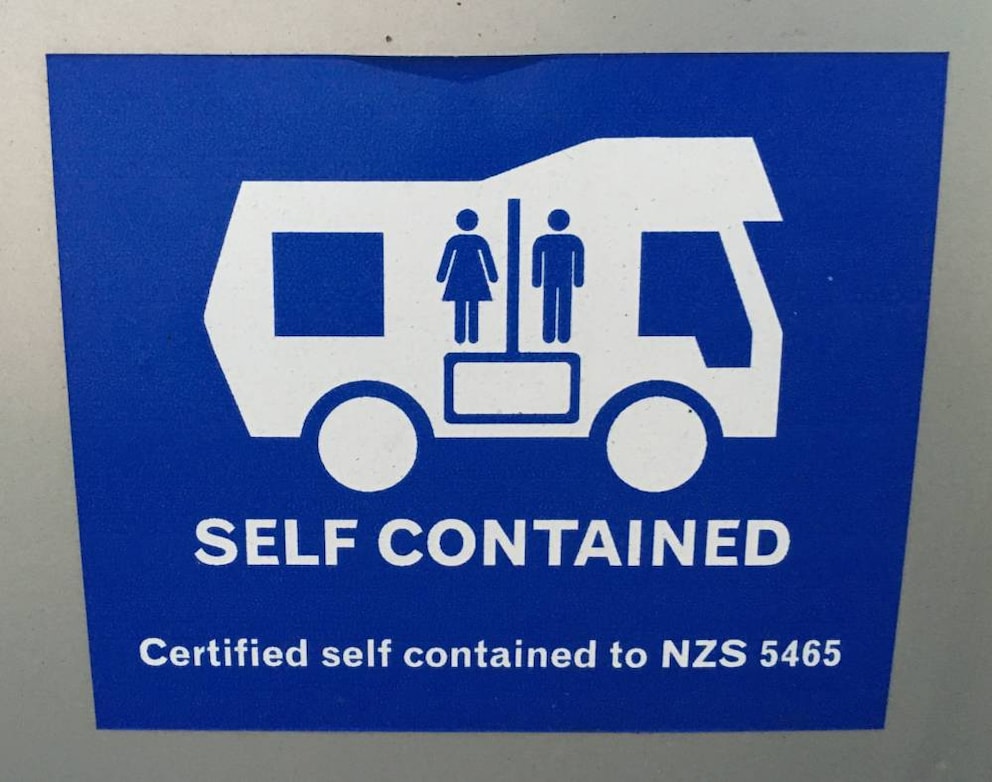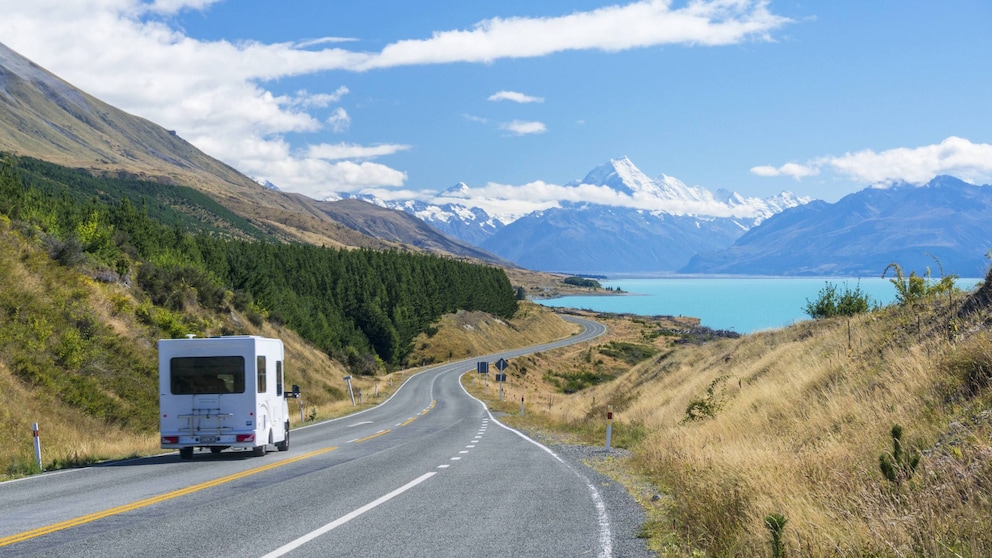December 5, 2024, 11:15 am | Read time: 7 minutes
Are you dreaming of a van trip through New Zealand? TRAVELBOOK author Anna Wengel has completed an extensive road trip across the island nation. Here, she gives tips to ensure that your journey in your own van is a wonderful one, with little to no annoyances.
New Zealand is best traveled in a van. At least that’s what I think. It takes you to every natural spectacle, no matter how unreal—because so damn beautiful—it seems. Or at least very close to cliffs, beaches, alps, waterfalls, lakes, fjords, etc. And you can not only stare at these natural beauties with huge eyes, you can even sleep there. Not even the most expensive luxury resorts can offer such views. Not to mention the feeling of absolute freedom when you simply do whatever it is you want—and don’t disturb anyone. In the van, you don’t have to worry about timetables, other guests, check-in and check-out times, and other restrictive nonsense. Only nature. And depending on where you’re staying at night, maybe other campers or residents—but that can be avoided.
So there are many reasons for a nomadic van life in New Zealand. But how exactly does it work with the van? And what should I bear in mind when buying a mobile bed to put under my butt? You can find the answers in the following tips on TRAVELBOOK—all of which self-experienced, of course.
Where Can I Find a Suitable Car?
Buying a Car: When, How Much, and Where?
If you are in New Zealand for more than a few weeks, it is worth buying a van. For example: I paid 4,000 NZ dollars, the equivalent of just under 2,400 euros, for my simple (and much loved) Toyota Hiace from the 90s in early 2018. There are vans for much less and, of course, some for much more money. It often depends on the equipment, age, mileage, and time of year. From the end of the summer (around March), many New Zealand travelers sell off their mobile accommodation, wanting or needing to get away quickly, and move on. Especially in the New Zealand winter (from June onwards), vans can be bought cheaply. At the beginning of the season, however, many sellers are relaxed, because they know that the van-loving masses will come and pay.
There are several ways to find your van. A common one is Trade Me. The website is like New Zealand’s Ebay. You can get everything here, including cars. Facebook is another way. In New Zealand, for example, there is the Facebook group “Van NZ buy and sell”, as well as various others. And then there was also the real offline world. Garages, buy and sell stores, and the like also sell, as do private individuals who have a “For Sale” sticker in the window.

Selling Your Car
Just as you buy your van, you can also sell it again when the trip is over: Trade Me, Facebook, notes in the window, Buy & Sell—just try your luck. Depending on the time of year, it’s best to use several methods. Incidentally, selling is one of the reasons why buying is particularly worthwhile. When I sold my last van, I got pretty much exactly the same money as I paid when I bought it, so I lived almost expense-free for three months. However, you shouldn’t rely on this one hundred percent—after all, you’re buying a used car. The first van that drove me around New Zealand ten years ago broke down completely on the journey. Of course, that also meant the sale money was gone.
Rent a Car
If you’re not staying quite so long and would rather rent a car, we recommend Eurocampers. There you can put together individual packages or specials for different vehicle sizes and classes. The owner also speaks German, which—depending on your knowledge of English—can also be an advantage.
What Insurance Do I Need?
Car owners in New Zealand are not legally obliged to take out car insurance. However, if you drive into something, break down because of damage to your van or because you forgot to refuel in time, or something else happens for which you need a little more help than friendly people can or want to give you, it can be quite expensive without insurance. A common and, in my experience, reliable insurance is AA. Insurers offer different packages. The cheapest one is usually sufficient and covers the costs if you cause damage yourself. What convinced me at the time was the option to cancel at any time. I didn’t know how long I wanted to stay in New Zealand. When I then decided to cancel my annual contract early, I got the overpaid money back without any problems.
Don’t Forget Registration and WoF
Registration and the WoF, short for Warrant of Fitness, are at least as important as the insurance. Both are stuck to the front windshield together with the expiry date. If they have expired and someone discovers this, it can be expensive. Selling a vehicle can also be difficult, especially without a WoF. If you need to renew the WoF during your trip and want to save costs (and sometimes nerves), it is best to do this at a WoF-certified workshop. They will do what is really necessary. The largest vehicle inspection body VTNZ is different. In the case of older vans, they like to be bothered by little things that do not affect driving and driving safety, and, therefore, fail the vehicle. A slightly dusty brake that is even easy to clean can sometimes become a huge problem. And that can cost money.
Registration depends on the valid WoF and can be extended at many post offices. Here, the car is also transferred to a new owner, quite simply with a piece of paper and without any great proof.
Can I Park Wherever I Want?
Yes and no. There are places that are clearly marked with an overnight and parking ban. You are not legally allowed to park there overnight, or at all. Otherwise, New Zealand is still quite liberal when it comes to overnight accommodation in a van. On one condition: The van must be self-contained before it can be parked anywhere. This means, it must be equipped with a toilet, sink, waste water canisters, and hoses inside. A blue and white sticker proves that it is. It looks like this:

From my own experience, I can report that not only are there inspectors, but they also turn up at seemingly impossible times. I parked my non-self-contained van overnight in a stupid, clearly forbidden spot because of a flat tire. Since it was late, raining cats and dogs, and the public parking lot was near a public restroom, I thought that was okay. However, someone else felt disturbed. So at 2.30 in the morning, an inspector crept around my car and photographed it from every conceivable angle. The fine: 200 NZ dollars (approx. 120 euros). As absurd as this nighttime action was, the people in the office were very accommodating after I explained my situation. I never had to pay. Nevertheless, I recommend everyone to get one of these stickers. Anything else can be unnecessarily annoying.

You Want To Earn Money While Traveling? Here Are 11 Tips To Realize Your Dream

How to guarantee a successful trip with children

5 Types of Work That Make Long-Term Travel Possible
How Do I Find Public Showers and Toilets?
Speaking of public toilets. If you’re driving a non-fully equipped version of a camper, toilets and showers are constant issues. Camper Mate is the solution. The app is a lifesaver for pretty much any van life issue. It knows numerous public toilets, showers, gas stations, Wi-Fi spots, and many other things that will seem important to you on your trip. Camper Mate also works in New Zealand and Australia.
The many so-called iSITEs throughout the country are also helpful. The tourist information center has an answer to every holidaymaker’s question.
The original of this article was published in 2019.

